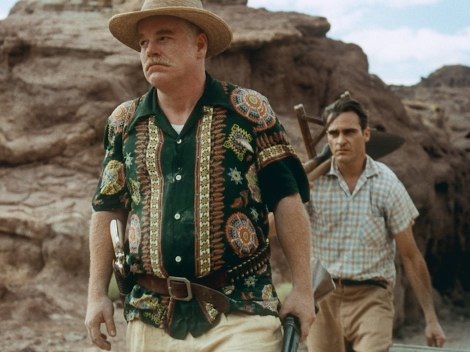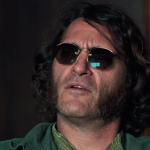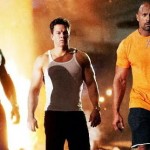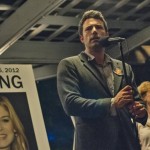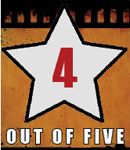
Somewhere along the way — perhaps immediately after Boogie Nights — Paul Thomas Anderson became less interested in telling stories than he did in just suggesting them, using the tricks the medium of film offers along with a series of brilliant, intense performances to make up for the fact that his movies no longer bothered with traditional narratives. This isn't a complaint, mind you. Anderson has more than enough talent as a writer and director to pull it off. I still think Boogie Nights is his masterwork, partly because that movie is anchored by a more-straightly-told story, but there's no doubt that his other, more esoteric films, especially There Will Be Blood and Punch Drunk Love, surge with their own strange power.
You can now add to that list The Master — an idiosyncratic and fascinating story about an aimless, wandering World War II veteran named Freddie Quell who, in the late 1940s/early 1950s, is swept up by a growing quasi-religious movement spearheaded by Lancaster Dodd, a charismatic intellectual surrounded by a cult of devoted followers. The relationship between these two men, played by Joaquin Phoenix and Philip Seymour Hoffman respectively, is the film's driving force; the towering performances by the two, its life blood.
We meet Quell first, on the beaches of Japan during the war, doing unspeakable things to a sand sculpture of a naked woman. Quell may be insane, or perhaps he's just a man who has trouble keeping his animalistic urges in check. The movie offers evidence supporting both. Either way, he returns from the war broken and directionless, until he sneaks aboard a party yacht owned by Dodd. The stowaway is discovered, and Dodd quickly takes a liking to the man, or at least to the unique alcoholic concoctions Quell has a knack for brewing up from sources like paint thinner. Before long, Dodd is attempting to repair Quell's soul using a series of brutal and bizarre psychological tests he calls "processing." Over the course of the movie, the two become nigh inseparable. Quell grows attached to Dodd and his ideals because Dodd is the only person to ever take such an interest in him. And Dodd keeps Quell close because he sees in Quell a man whose unstable condition makes him perfectly suited to Dodd's new brand of salvation.
You've probably heard that The Master is loosely based on the origins of Scientology, with Hoffman's Dodd standing in for L. Ron Hubbard. That fact seems largely undisputed after seeing the movie, although upon exiting the theater I didn't feel the urge to run home and research all the things the film has in common with Scientology's beginnings. Those similarities are not the point of the movie, merely a jumping off point to examine the complex connection between the two men. In fact, the movie barely touches on the matter of whether Dodd believes in the shit he's preaching or whether he's just knowingly fabricating a bunch of nonsense to grow his flock (at least from Dodd's viewpoint — other characters do discuss it). Although I do suspect Anderson's thoughts on the matter slip through in one key scene where a devout follower played by Laura Dern questions Dodd on a bit of language in his newly published book. Dodd alters one of his movement's core tenants in order to make it more marketable to a mass audience. That says a lot about which side Anderson sits on, I believe, even if it's not integral to the film itself.
The Master continues Anderson's habit of leaving the stories he's telling jagged and vaguely unformed. A small example: Near the beginning of the movie, once Quell is back from the war, we see him working as a photographer in a department store portrait studio. He begins a dalliance with a pretty co-worker, and later, when he has a breakdown on the clock, he bolts from the store, dragging her with him as he goes. Except we never see the girl again after that scene. In a more traditional movie, we'd get an additional scene that shows her dumping him … or the added beat of Quell taking the girl by the hand to leave with him would have been dropped altogether to suggest he was leaving her behind as well. But, again, Anderson is not a traditional storyteller, and those rough edges contribute to The Masters' hypnotic appeal.
Both lead performances are prime awards bait — showy and unrestrained — but Phoenix is the one who leaves the bigger impression. The guy's every move screams awkwardness and frustration, the feelings of being trapped or lost or enraged — all traits primal to this character. I believe he's playing younger than he is for large parts of the film, but I swear that if you squint just right, his face bears the years of a 70-year-old man. It's an odd discordance, but Anderson exploits it to great effect. Hoffman, meanwhile, is as captivating as he almost always is, sometimes in movies far less worthy than this one. And though there's no question who the leads are here, Amy Adams deserves appreciation for her turn as Dodd's wife. She's cold and fierce and pretty damn great. Watch this and Enchanted back to back and just try to tell me the girl doesn't have killer range.
The Master feels a lot like a P.T. Anderson movie in that it's unsettling and unpredictable and designed to make you squirm in your seat a little. Although it does occasionally seem like something's missing, and I think I can pinpoint it. With Anderson's other films, a large part of that uncomfortableness comes from a looming threat of violence that can range from a general foreboding to a smothering, thudding sense of doom. Though Quell has a mean streak that reveals itself a few times during the film, there's never a sense that the story can fit in some cataclysmic act of brutality. So you're never really worried about one, which drains the power a bit from some of Anderson's long, ominous, static shots. Perhaps this isn't even a fair criticism, being that it's dependent on a knowledge of Anderson's entire body of work, but the baggage a filmmaker brings with him is one lens his newest work must be viewed through.
Regardless, the man is a hell of an artist. There's a sequence in the movie's final third that cross-cuts back and forth across a series of severe psychological exercises Quell is being subjected to that's thrillingly assembled. And the film's final scene featuring both Phoenix and Hoffman crackles with an energy you only get when two actors of this caliber are blowing out parts that you figure were already impressive when they existed only on the screenplay page.

